Contents
Pleven grapes are a common variety that attracts gardeners with good taste, resistance to diseases and winter frosts. For planting, stable and nutmeg varieties are often chosen. Varieties form large clusters, and the berries have excellent commercial qualities.
Characteristics of varieties
The name Pleven has several different varieties. All of them have a table purpose, are used fresh, for the preparation of snacks and desserts. Each variety has its own characteristics regarding the size of the berries, yield, resistance to diseases and winter frosts.
Pleven
Grape variety Pleven comes from Bulgaria. The variety has a table purpose. The bushes are vigorous, the shoots ripen well. The mass of the bunch is 250-300 g. The bunches are conical, loose and loose.
Features of Pleven berries:
- weight 4-5 g;
- large sizes;
- oblong shape;
- yellowish green;
- wax coating;
- crispy pulp;
- thick skin;
- harmonious taste.
The disadvantage of the Pleven variety is its low winter hardiness. Grapes are susceptible to fungal diseases. To protect against damage, the variety needs careful processing.
Vinograd Pleven in photo:
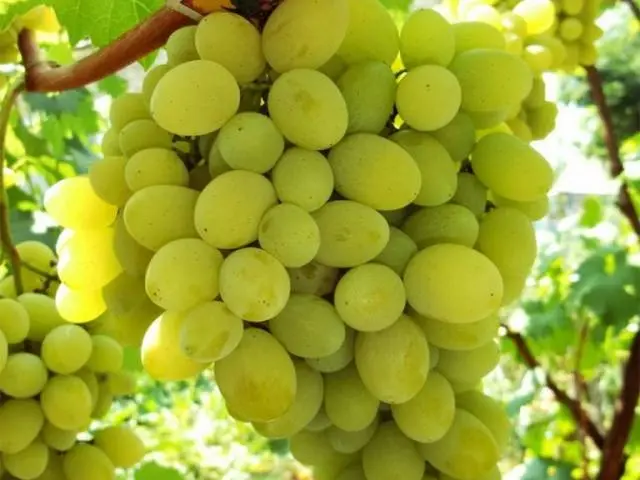
Pleven nutmeg
Muscat variety Pleven grapes are obtained by crossing the varieties Druzhba and Strashensky. Ripening occurs early.
According to the description of the variety and photo, Pleven muscat grapes are characterized by vigorous and powerful shoots. The mass of a bunch is from 600 g, usually reaches 1 kg.
Characteristics of Pleven nutmeg berries:
- White color;
- oval shape;
- size 23×30 mm;
- weight 6-8 g;
- thick skin;
- juicy pulp;
- nutmeg aroma;
- pleasant taste.
The variety is characterized by high yield. Grapes tolerate winter frosts down to -23 ° C, so they need shelter. Resistance to fungal diseases is rated at a high level.
Muscat variety is valued for its excellent taste. Gardeners note a good survival rate of grapes, low susceptibility to disease, active growth of shoots in spring and summer.
Photo of Pleven Muscat grapes:
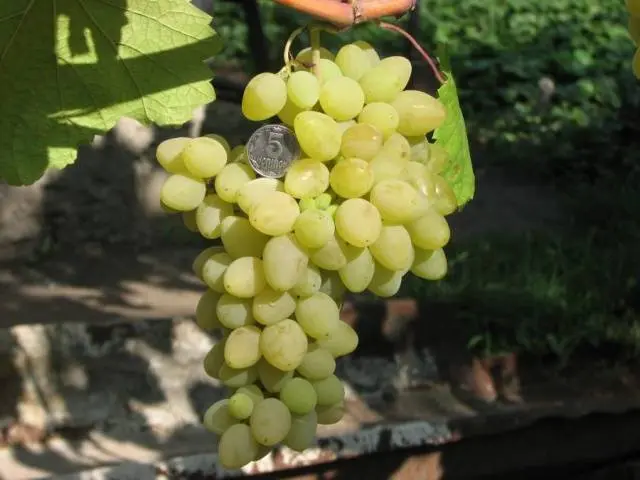
Pleven steady
Grape varieties Pleven resistant known under the name Augustine and Phenomenon. The variety was bred in Bulgaria on the basis of Pleven and Villars blanc grapes. The resulting variety is resistant to diseases and low temperatures.
Pleven resistant ripens in mid-August. According to external characteristics, the resulting variety resembles Pleven grapes. Clusters of medium density, conical shape. Their mass reaches 500 g. The yield per bush is up to 30 kg.
Distinctive features of berries of the variety Pleven resistant:
- size 18h27 cm;
- weight 5 g;
- simple and harmonious taste;
- White color;
- juicy pulp, translucent in the sun.
A sustainable variety of grapes is valued for its high yield, reliability and unpretentiousness. Clusters have high commercial qualities, do not deteriorate during transportation.
The fruiting of the Augustine variety is extended, lasting 2-3 weeks. The berries are of the same size, do not pea, hang on the bushes for a long time after ripening. Bushes grow rapidly, so they are often planted to decorate arches, arbors, and recreation areas. Winter hardiness is above average.
Pleven grapes are resistant in the photo:
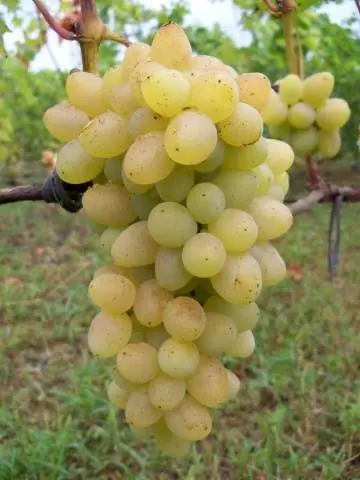
Planting of grapes
The development and yield of grapes largely depends on the choice of the right place for growing. The plant prefers an abundance of sunlight and the presence of fertile soil. Pleven grape seedlings are purchased from trusted suppliers.
Preparatory stage
Under the vineyard allot a plot well-lit by the sun and located on the south or south-west side. The culture does not tolerate moisture stagnation, so it is better to choose a place on a hill or in the center of a slope. In the lowlands, not only water accumulates, but also cold air.
In the northern regions, grapes are planted on the south side of the house or fence. By reflecting the sun’s rays from the surface of the walls, the plants will receive more heat.
The vineyard is planted at a distance of more than 5 m from shrubs and trees. This arrangement avoids shady areas. Fruit trees take most of the nutrients from the soil and do not allow the grapes to fully develop.
Landing pits are prepared at least 3 weeks before work. Culture prefers loam or sandy soil. If the soil is clayey, coarse river sand will be required. To better retain moisture, sandy soil is fertilized with peat.
Order of work
For planting, choose healthy seedlings of Pleven grapes with a height of about 0,5 m and healthy buds. Plants with overdried roots and damage do not take root well.
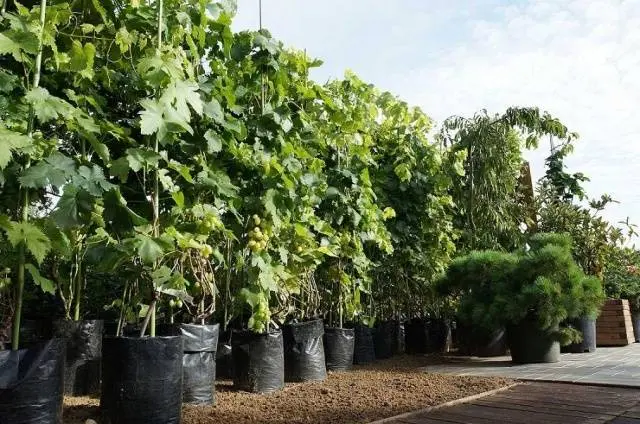
Sequence of work:
- Under the grapes they dig a hole measuring 80×80 cm to a depth of 60 cm.
- Be sure to form a drainage layer 12 cm thick. Expanded clay, broken brick, small pebbles are used for it.
- A pipe with a diameter of 5-7 mm is installed in a vertical position in the pit for watering plants. Part of the pipe is left to protrude above the ground.
- 0,4 kg of superphosphate and 0,2 kg of potassium sulfate are added to the fertile soil. The resulting mixture is poured into the pit.
- When the soil settles, proceed to the preparation of the seedling. It is cut off, leaving 3-4 buds. The root system is also slightly shortened and placed for a day in warm clean water.
- A small hill of fertile land is poured into the pit, a seedling is placed on top.
- The roots must be covered with earth.
- The plant is abundantly watered with 5 buckets of water.
When planting several plants, a distance of 1 m is maintained between them. According to the description of the variety, photos and reviews, saplings of Pleven muscat and stable grapes quickly take root. Young plants require intensive watering.
Care scheme
Pleven grapes are provided with good care, which consists in fertilizing, pruning and watering. For the prevention of diseases, it is recommended to carry out preventive spraying.
Watering
Only young bushes under the age of 3 years need regular watering. They are watered with a drainage pipe several times a season:
- after removing the winter shelter;
- when forming buds;
- during the flowering period;
- late autumn.
Podzimny watering is necessary for each Pleven grape variety. Moisture is applied in late autumn during the preparation of plants for winter. Wet soil freezes slowly, and the grapes endure the winter better.
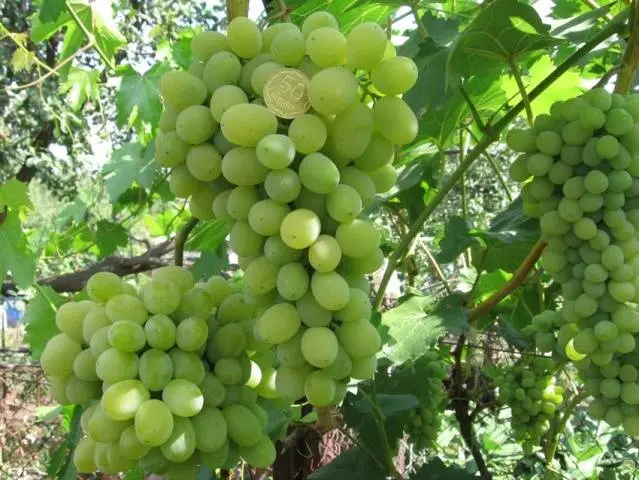
Feeding
In early spring, Pleven grapes are fed with fertilizer containing nitrogen. Chicken manure or manure is introduced into the soil. Instead of organics, you can use minerals: 40 g of urea and superphosphate and 30 g of potassium sulfate.
The treatment is repeated until the beginning of flowering. When the fruits ripen, only phosphorus and potash fertilizers are applied. Nitrogen activates the growth of shoots, while in summer it is better to direct the forces of grapes to the formation of berries.
Grapes respond positively to foliar treatments. Plantings are sprayed with complex preparations of Kemira or Aquarin. After harvesting, the plants are fed with wood ash. Fertilizer close up in the soil.
Trimming
Due to pruning grapes provide high fruiting. Pleven varieties are pruned in the fall after harvesting.
4-5 most powerful shoots are left for each bush. Fruit branches are shortened by 6-8 eyes. Permissible load on the plant – from 35 to 45 eyes.
After the snow melts, only frozen and dry branches are removed. In the spring, the number of clusters is normalized. 1-2 inflorescences are left on the shoot, the rest are cut off.
In summer, it is enough to remove the leaves so that the berries gain sugar content. Also eliminate extra stepchildren.
Protection against diseases
Muscat and resistant varieties of Pleven grapes, subject to agricultural practices, rarely get sick. For preventive purposes, plantings are sprayed with antifungal drugs. Processing is carried out in early spring and late autumn.
The preparations are diluted with water in the concentration provided for by the instructions. During the growing season, the last treatment should take place 3 weeks before harvest.
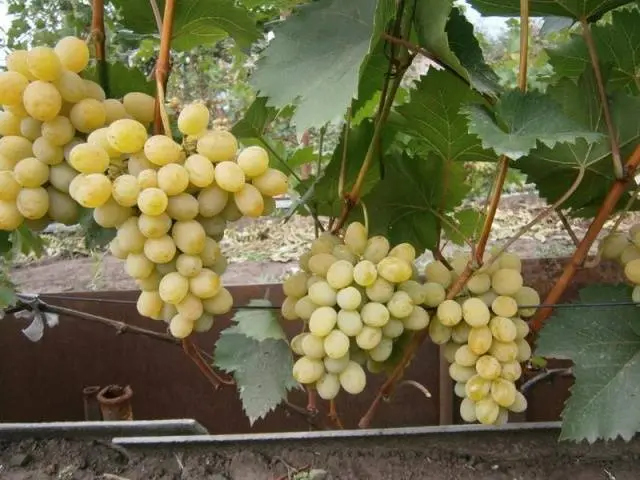
The vineyard attracts ticks, goldfish, cicadas, caterpillars and other pests. If insects are found, the plantings are sprayed with special preparations. To protect the crop from wasps and birds, the clusters are covered with cloth bags.
Shelter for the winter
Pleven grapes are recommended to cover for the winter, especially if a cold snowless winter is expected. In autumn, the vine is removed from the support, placed on the ground and spud. Dry leaves are sprinkled on top.
Metal or plastic arcs are installed above the plant, agrofiber is fixed on top. So that the grapes do not ripen, when the temperature rises in the spring, the shelter is removed. If there is still a possibility of frost, the covering material is slightly opened.
Reviews of gardeners
Conclusion
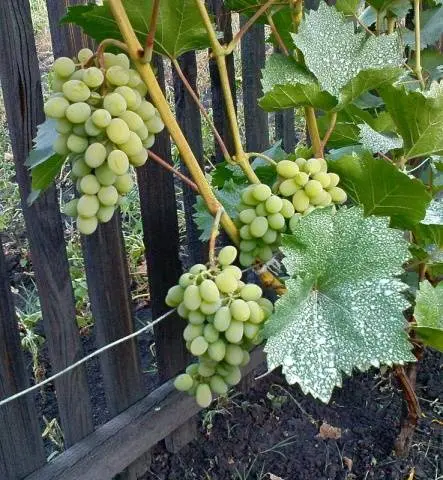
Pleven grapes are suitable for industrial cultivation and planting in a summer cottage. Clusters have an excellent presentation and tolerate transportation well. Muscat and resistant varieties are characterized by rapid maturation, good taste of berries and unpretentiousness.









